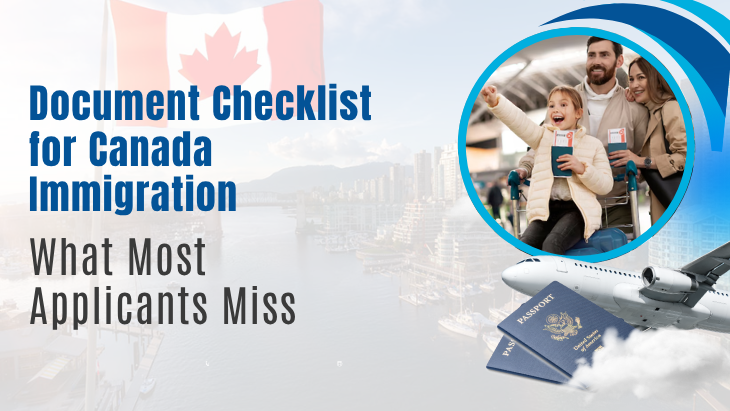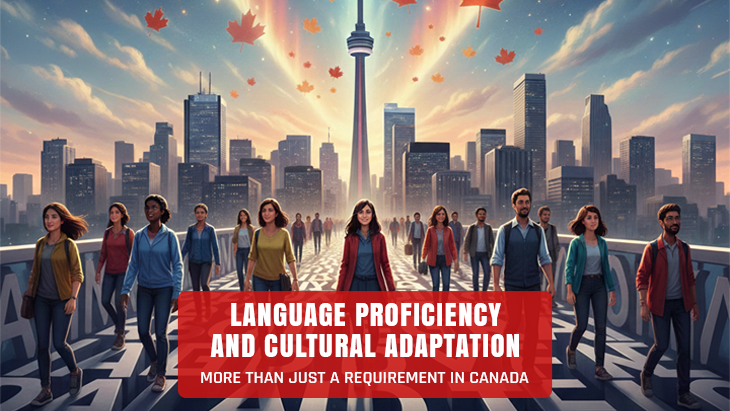Canada remains a top destination for immigrants seeking better opportunities, quality of life, and stability. But before you pack your bags, there’s a critical step you can’t afford to overlook — documentation. Missing even a single essential document can delay your application or lead to outright rejection.
In this blog post, we’ll cover the standard document checklist for Canada immigration and highlight the most commonly missed or misunderstood documents. Whether you're applying through Express Entry, a Provincial Nominee Program (PNP), or a family sponsorship, this guide will help ensure your file is complete.
Standard Document Checklist for Canada Immigration
Below is a general list of documents required for most Canadian immigration programs. Always verify based on your specific program, but here’s what’s typically needed:
1. Identity and Civil Status Documents
- Valid passport (scanned copy of all pages)
- Birth certificate
- National ID (if applicable)
- Marriage certificate / Divorce certificate / Death certificate (for spouse)
- Adoption records (if applicable)
- Police clearance certificates from all countries where you’ve lived for more than 6 months
2. Educational Credentials
- Degree/diploma certificates
- Transcripts for each program completed
- Educational Credential Assessment (ECA) from designated organisations like WES or IQAS
3. Language Test Results
- IELTS General Training or CELPIP (for English)
- TEF Canada or TCF Canada (for French)
- Results must be less than 2 years old at the time of application
4. Work Experience Proof
- Reference letters from past employers
- Pay slips, tax documents, and appointment letters (if needed to support claims)
- Company registration documents if self-employed
- Employment contracts
5. Proof of Funds
- Bank statements for the last 6 months
- Letters from banks outlining account balance and average daily balance
- Property evaluations or investment documents (if accepted)
- Gift deed (if using funds gifted by family)
6. Medical Examination
- Must be done by an IRCC-approved panel physician
- Results are sent directly to IRCC by the clinic
7. Photographs
- Digital photos meeting IRCC specifications
- Recent, colored, with white background
What Most Applicants Miss — and Why It Matters
Even when applicants submit the basic requirements, many overlook these critical items, which can jeopardise the application:
1. Missing Reference Letter Details
IRCC requires specific information in your employment reference letters:
- Job title
- Salary and benefits
- Employment duration (start and end date)
- Hours worked per week
- Detailed list of duties and responsibilities (should match NOC codes)
- Contact information and company letterhead
Common Mistake: Submitting generic HR letters or offer letters instead of detailed job descriptions.
2. Outdated or Expired Documents
- IELTS scores older than 2 years
- Police clearance certificates issued more than 6 months ago
- ECA reports past their validity
Common Mistake: Assuming once-submitted documents remain valid indefinitely.
3. Incomplete Proof of Funds
- Submitting only bank statements without bank letters
- Ignoring the daily balance or sudden large deposits
Common Mistake: Failing to explain the source of sudden large deposits — leading to suspicion of fund inconsistency.
4. Inadequate Translation and Notarization
- Any document not in English or French must be translated by a certified translator
- Must include the translator’s affidavit, source document, and the translated version
Common Mistake: Using self-translated or uncertified translations.
5. Omitting Travel History or Personal History Gaps
- You must provide your full travel and personal history for the last 10 years or since age 18
- Include exact dates (MM/YYYY format)
Common Mistake: Leaving unexplained gaps in your travel/work/education timeline.
6. Not Including Spouse’s or Dependent’s Documents
- Even if your spouse is not accompanying you, some programs still require their:
- Passport copy
- Police certificate
- Language test (for extra CRS points)
Common Mistake: Assuming you can ignore spouse/dependent documentation if they're not immigrating.
Tips to Avoid Delays and Rejections
- Use a detailed document checklist customised for your immigration program
- Double-check expiry dates of all time-sensitive documents
- Label and organise documents clearly with file names like “01_Passport_Akshita.pdf”
- Provide LOEs (Letters of Explanation) wherever necessary, especially for:
- Gaps in employment
- Unusual financial transactions
- Name mismatches
Final Thoughts
Applying for Canada immigration is a life-changing decision, and paperwork plays a make-or-break role. A well-prepared, fully documented application significantly improves your chances of approval.
Avoid delays or rejection by not overlooking key items. Use this checklist as a guide, and consider consulting an immigration expert for additional assurance.














Post Comments